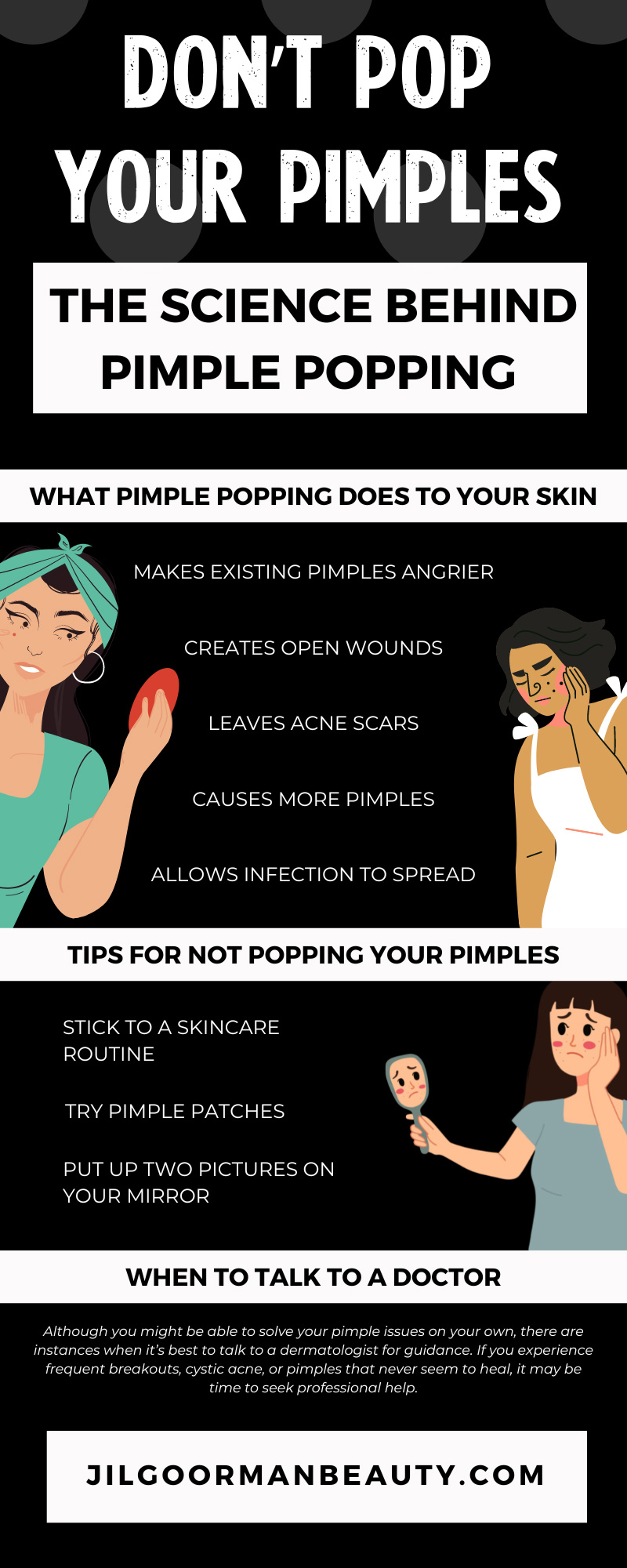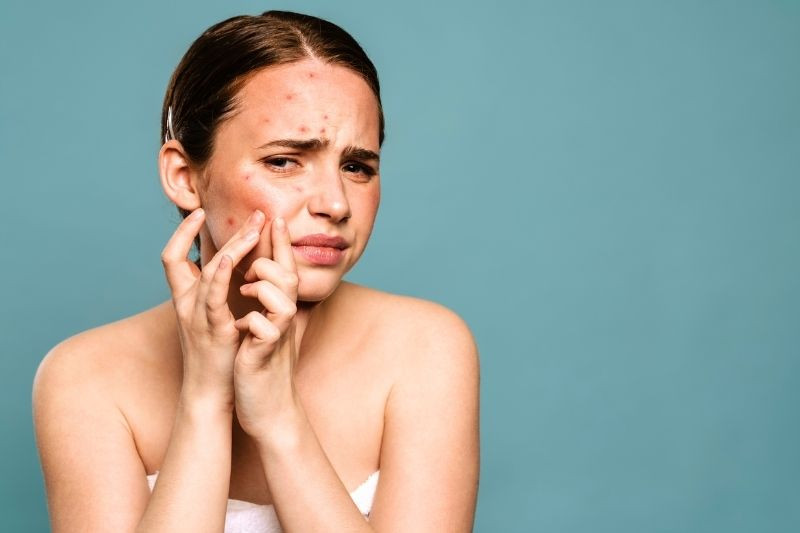There’s nothing worse than a pimple showing up on your face the day before a photo-worthy event, but it seems to be a common occurrence for many people. Although your first instinct may be to pop it, that’s not always the best choice. Most dermatologists would agree that popping and picking at pimples only makes matters worse; however, that doesn’t stop everyone from doing so. Popping your pimples might make you feel better, but it usually doesn’t make them appear any better. Follow along to learn the science behind pimple popping and encourage yourself not to pop your own.
What Pimple Popping Does to Your Skin
Most people think popping their pimples is the only way to get rid of them, but that’s certainly not the case. In fact, it’s actually the most harmful way to handle them. If you have the desire to pick or pop your breakouts, discover what pimple popping can do to your beautiful skin.
Causes More Pimples
You may have a single breakout on your face, but popping it can cause more pimples to pop up within a few days or weeks. Squeezing out the contents of a pimple is a surefire way to impact the surrounding skin. That said, it’s very likely for additional breakouts to occur in the same general area of your face, chest, or back.
If you notice more pimples appearing on your skin after popping the initial one, you have first-hand experience with the aftermath of pimple popping. Now that you know, you can avoid doing this in the future.
Creates Open Wounds
Having an open wound anywhere on your body is never a good thing because it allows bacteria, dirt, debris, and pollutants to enter your body. Although the wound from a pimple is much smaller than that of a cut or lesion, it’s still large enough for an infection to start. While it may be uncommon, it is possible to get dangerous bacterial infections through acne wounds.
Leaves Acne Scars
If you’ve ever picked a scab repeatedly, you know that it usually results in a scar. Unfortunately, the same thing is true for blemishes and breakouts. If you pop your pimple, you’ll most likely have to pop it more than once before it’s gone. This might not seem like a big deal, but a scar can develop after a few instances of popping or picking the same spot.
Makes Existing Pimples Angrier
You probably think popping your pimple will make it stop hurting, but that’s not usually the case. Truthfully, popping and picking is the best way to make existing pimples angrier. If you’ve ever decided to pop a pimple because it was causing you pain and appeared red on your face, you’ve likely found that it hurt worse and became brighter red after the fact.
Rather than popping and picking in an attempt to calm angry breakouts, consider applying ice or something cold to reduce the inflammation. Your breakouts will most likely calm down within a day or two if you don’t mess with them, but intervening can drag out the healing process to a week or more.
Allows Infection To Spread
As previously mentioned, pimple popping leads to open wounds. If you have multiple patches of acne at the same time, you could cause even more skin damage. If you pop and pick at all the blemishes on your face, you’ll most likely spread acne-causing bacteria and infection to all of your pores. This, in turn, increases your chances of more breakouts. You might end up in a continuous cycle of acne if you frequently pop your pimples and spread the infection to surrounding pores.
Tips for Not Popping Your Pimples
Now that you know how popping your pimples can impact your skin quality, it’s time to consider a few tips to avoid doing so. Popping and picking are serious habits for many people, and stopping these tendencies is the only way to bring back bright, beautiful skin.
Try Pimple Patches
Pimple patches are a relatively new form of acne treatment, but they’re incredibly helpful. These patches stick to your skin and provide a protective coating over the pimple. And most of them have acne-fighting therapy on the skin side to help reduce the appearance of a breakout overnight. If you feel a pimple coming through or have an active one, apply a patch over it for six to eight hours.
Stick to a Skincare Routine
Your skincare routine is one of the best ways to prevent and treat acne, but it’s not the only solution. If you don’t have an existing routine, consider starting one—you just need an acne kit for oily skin to begin. Cleansing your face twice daily is the key to reducing your chances of breakouts, and caring for your skin is an effective way to combat the urge to pop and pick.
Put Up Two Pictures on Your Mirror
Put up two pictures on your mirror to encourage yourself. One should be what your face will look like if you keep popping and picking, and the other should be what you could look like with clear, bright skin. These two images can help encourage you to stop popping your pimples.
When To Talk to a Doctor
Although you might be able to solve your pimple issues on your own, there are instances when it’s best to talk to a dermatologist for guidance. If you experience frequent breakouts, cystic acne, or pimples that never seem to heal, it may be time to seek professional help. It’s not uncommon for acne to make people feel uncomfortable or self-conscious, and dermatologists want to help. They can provide skincare guidance, treatment options, and the best products to use for your skin type.
After learning more about the science of pimple popping, keep reminding yourself not to pop your pimples. Even though it may seem like the ideal option, you should really keep your hands away from your face. Popping and picking at your pimples isn’t a good idea, as it may leave you in a worse situation than when the breakout appeared. Keep your face clean and use acne-fighting products to help acne heal quickly. And whatever you do, avoid touching your face without washing your hands first.


